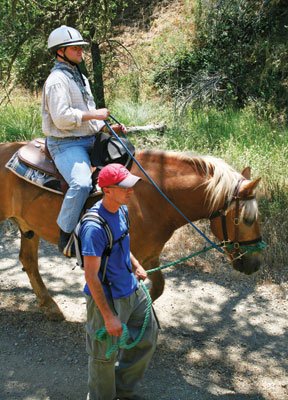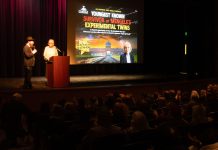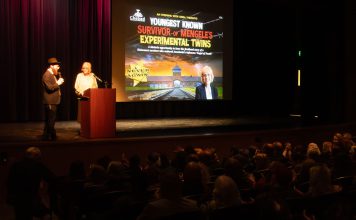A pinch of patience, a dash of adventure and a whole lot of love
made for a wilderness trip not to be forgotten for five young men
trekking out into the great outdoors, some for the first time.
Also with this story, a video of photo gallery.
A pinch of patience, a dash of adventure and a whole lot of love made for a wilderness trip not to be forgotten for five young men trekking out into the great outdoors, some for the first time.
As part of the Equine Journey Wilderness Program, an offshoot of DreamPower Horsemanship – a nonprofit organization in San Martin that provides therapeutic horsemanship programs – a gang of equestrians, cowboys, therapists and five Santa Clara County students rode deep into Henry Coe State Park for a weekend of fishing, camping and hiking.
Suited for students with social or developmental disabilities, the program combined horsemanship skills, a character development curriculum and wilderness experiences in a 14-week curriculum designed to get kids off the couch, out from in front of the television and into nature. Guided by the Cowboy Code, the students were plunged into the unknown and forced to operate outside of their comfort zone and “cowboy up” – one of the most difficult parts of the program, Program Director Garry Stauber said.
“These guys are fish out of water,” he said while reclining in full cowboy attire on the shore of Kelly Lake while his proteges patiently waited at water’s edge for tugs at the end of their fishing lines. “They have to look to us for help.”
Although the fish were few and far between, the boys and their mentors spent the day away from cell phones, televisions and the blare of traffic to enjoy the sun on their backs, the breeze on their faces and the peace and quiet that is so lacking in the day-to-day drone of everyday life. The boys divided their time between exploring the lakeside, snapping photos and relaxing in the sunshine. The informal afternoon was a reward after weeks of lessons in honesty, self-control and cowboy values.
“There’s a lot of good stuff that you learn here,” said Albert Chu, 22, as he wandered around with his camera, trying to capture a photo of a red winged black bird nesting among the reeds. “There are some cowboy morals that they teach you like honesty and being truthful. They also teach you how to be respectful to your other buddies.”
Taking a break from fishing, another student, Joe McCool, 22, wrapped a soaked bandana around his neck to keep him cool and shield him from the sun – “I get burned easily,” he said. The only one to have caught a fish that afternoon, McCool – also known as Cowboy Joe for his regular uniform of boots, chaps and a cowboy hat – took a break from fishing to prepare himself for the four-mile haul back to camp on his horse, Red.
“Riding the horses is hard to do,” he said. “You have to learn balance.”
But after 14 weeks of getting to know Red, he mounted his horse like an old pro, under Stauber’s watchful eye.
The pack of riders made their way slowly back to camp where they were greeted by the sweet aroma of beans stewing with onions, garlic and bacon wafting from the Dutch oven that had been simmering for hours. Paired with a tender brisket, the boys’ dinner was a far cry from the usual camp food of roasted weenies and marshmallows. The makeshift kitchen was manned by Don Van Straaten, one of the many volunteers along for the ride who pitched in to keep the weekend running smoothly.
“That’s Garry’s forte,” Von Straaten said, lifting the heavy lid to stir the bubbling beans. “He holds the vision and people just show up.”
Like several other volunteers, Von Straaten joined the group for an abbreviated camping trip only a few weeks into the program, the boys’ first taste of the wilderness.
“The boys have changed so much since the last camping trip,” he said. “It makes what I do – shoveling poop and cooking – all worth while.”
Nestled in the heart of scrub oak country, the campsite was dotted with tiny tents and folding camp chairs, but not a trace of litter could be seen. The boys took a cue from their leaders and made sure to leave the campsite in the same, if not better, condition than they found it, said Sue Floethe, adaptive physical education specialist with the Santa Clara County Office of Education. She remembered several examples when her students imitated the behavior modeled by their mentors, offering water to thirsty passersby and collecting trash left behind by campers that spoiled the pristine landscape.
“Education doesn’t have enough men,” she said. “Teaching really needs a shot in the arm. We need more male role models. That’s why people like Garry are awesome. He’s got a heart as big as the outdoors.”
The volunteers and program facilitators may hold a variety of occupations during the week, but when they got wind of the Equine Journey program, they couldn’t resist offering a helping hand. Floethe had been taking her students on outdoor adventures for years and recognized a real gem when she stumbled across the Equine Journey pilot program, she said.
“I’ve seen them progress exponentially,” she said of her students. “They’ve gone from being somewhat fearful and hesitant … to becoming pretty confident in the outdoors, confident with their decisions. And they’ve created a bonding with the cowboys that you can’t get in a classroom.”
Stauber, the head cowboy, got as much, if not more, out of the program than the pupils did.
“I’m not a super giving guy,” he said, fighting back the tears that tend to form when he talks about the effect the boys and the outdoors had on him. “They change you more than you change them. I never thought 90 percent of my retirement would be devoted to helping kids. I’m crying about this – you should hear me talk about the mountains,” he laughed.
Back at camp, Stauber offered words of praise, tips and hugs to the cowboys-in-training. Armed with a tube of sunscreen, Floethe badgered the boys into applying the goo, sprayed their necks with water and warned them against filling up on snacks before dinner. After the ride back to camp, the volunteer cowboys herded the horses toward food and water. Exhausted from the ride, the boys and their mentors traded stories and rehashed the day’s activities as they settled down in a ring of chairs set up under a towering oak tree. As the sun slanted lower toward the horizon, the group waited patiently for the dinner bell.
“If you just put in more vegetables and more meat, it’s gonna taste good,” Stauber said, comparing the rich mixture of foods that comprise a tasty meal to the combination of nature, horses and values that coalesce to enrich the students’ lives. “You just have to keep throwing the good in.”













